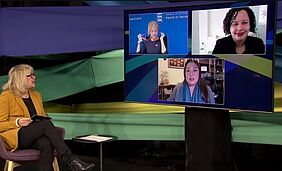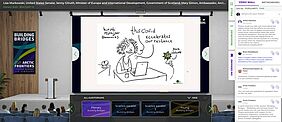Arctic Frontiers is an annual event addressing the most pressing issues facing the Arctic. Each year it brings together decision makers, indigenous leaders, businesses and youth representatives from all countries with an interest in the Arctic. The topic of this year’s edition is “Building bridges”. The conference explores “important connections within the Arctic, but also complicated connections with political, economic and natural forces outside the region that have a profound effect on the Arctic and the other way around “. The event stretches over 4 days, with a different focus on each day.
The NPA programme was invited to contribute to day 1: Wellbeing and Societal Health, with a presentation during the plenary “Arctic responses to Covid-19”. Kirsti Mijnhijmer introduced the story and experience of the NPA Covid-19 response group. This involves healthcare experts, practitioners, technology experts and others from NPA countries as well as Canada and the US, who came together to exchange valuable data and experiences in how to address the pandemic in remote communities. “Cooperation is our daily business, but the work of this group reminded us how valuable cooperation and trust are in times of need and that these values could really be relied on” said Kirsti.
In April 2020, the NPA programme was able to design and launch a call with small project funding to support this work. The programme funded 7 COVID response projects, 6 thematic projects and one overarching umbrella project (CoRE) that will collect and summarise all findings during the spring of 2021. The projects are not yet finalised, but some early findings were shared with the Arctic Frontiers audience:
- The suggestion that smaller countries tended to do better in terms of their public health response, rural areas tended to do better than urban areas.
- Community response: countries with an organised community level structure were able to deliver support quickly and in a more targeted way, but generally rural areas have a tradition of being self-reliant.
- Some countries were better set up for remote work, e.g. if they are used to unreliable weather.
- Technology can help improve the public health response to COVID such as tracing apps and apps to assist vulnerable groups, but also assisting healthcare workers in communicating with patients
A short video was played about the NPA Covid-19 reponse group.
What can we learn from the Arctic regions?
Speaking to the Arctic Frontiers audience was also the opportunity to share learnings from the Arctic regions, that are valuable for all of Europe. “In this COVID-19 pandemic, I believe Arctic regions can teach us valuable lessons about resilience in the face of shrinking and ageing communities and dealing with economic blows,” explained Kirsti. “Arctic regions are well positioned and ahead of the curve in some areas when it comes to the use of technology, because it makes it possible to maintain a certain level of services including healthcare, it makes business and educational opportunities available in remote areas, and through COVID, this trend appears to be accelerating.”
Projects SENdoc and COVIDWATCHEU_NPA at the Arctic Frontiers Science sessions
In addition, two NPA projects presented at the Arctic Frontiers Science sessions of the conference: SENdoc and COVIDWATCH EU NPA.
James Gillespie from the Ulster University team leading NPA project SENDoc attended the virtual Arctic Frontiers Conference Science session. He presented "A Transnational Home-Based Rehabilitation Service Delivery Model", which was one of the deliverables from the SENDoc project. The work details how technology can be added to the existing rehabilitation model, turning it from a clinic-based service model into a telehealth model. The incorporation of technology to the model will ensure that people living in rural and sparsely populated areas, particularly the elderly, have access to the relevant experts and care that they need.
Professor Liam Glynn presented the work of the COVIDWATCH-EU-NPA project. Through a collaboration with clinical teams across the NPA region, the “COVIDWATCH-EU-NPA” project provides regularly updated comparative data with clinical interpretation between NPA and non-NPA regions on a country-by-country basis.
At the conference, Professor Glynn highlighted the learnings and challenges that emerged during the work of the project. “We feel there is still a need to learn from COVID-19, and different approaches in different countries affords us this opportunity”.
The collaborative transnational data collection infrastructure that COVIDWATCH-EU-NPA delivers has the potential to be vitally important to inform countries and regions as they try to navigate their way through the lifting of restrictions in the next phases of the COVID-19 pandemic. Publishing real-time data (#COVIDWATCHEU_NPA), the goal of COVIDWATCH-EU-NPA is both to inform the public as well as support decision makers. “Tell the unadulterated truth; do not be afraid to describe the statistics as the public can follow, but at the same time keep the human element and cost of the pandemic front and centre”, said Professor Glynn.


